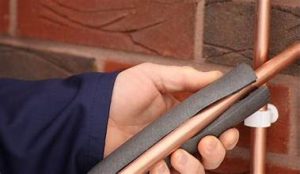Winter can be brutal on your home’s plumbing, especially if you’re not prepared. Frozen pipes can lead to costly repairs, water damage, and major inconveniences. That’s why service professionals recommend taking steps to protect your pipes before temperatures drop. One of the best ways to do this? Pipe insulation.
But does it work? Let’s break it down and share some expert tips on how to keep your pipes from freezing this winter.
How Pipe Insulation Helps Prevent Freezing
Pipe insulation is a simple but effective way to prevent freezing. It works by adding a layer of protection between your pipes and the cold air, reducing heat loss and keeping water flowing. Here’s how it helps:
- Maintains Warmer Temperatures – Insulation slows down heat transfer, keeping the water inside your pipes at a more stable temperature.
- Reduces the Risk of Freezing – When pipes are exposed to freezing air, the water inside can freeze and expand, leading to bursts. Insulation helps prevent this.
- Saves Energy & Money – Insulated pipes retain heat better, reducing the need for extra heating and lowering your energy bill.
- Protects Against Condensation – Insulation also prevents condensation, which can lead to corrosion and weaken your pipes over time.
Best Practices for Protecting Your Pipes
Professional plumbers take a multi-step approach to preventing frozen pipes. Here’s what they recommend:
1. Insulate Exposed Pipes
Pipes in unheated areas — such as attics, basements, garages, and crawl spaces — are at the highest risk. Wrapping them in foam insulation sleeves or fiberglass insulation can make a big difference.
2. Seal Air Leaks
Even a small draft can expose pipes to freezing temperatures. Use caulk or insulation to seal gaps around doors, windows, and where pipes enter your home.
3. Keep the Heat On
If you’re leaving home during cold weather, don’t turn the heat off completely. Keeping your thermostat set to at least 55°F ensures pipes stay warm enough to prevent freezing.
4. Let Faucets Drip
On extremely cold nights, letting a small trickle of water run from faucets can prevent pressure buildup and reduce the risk of freezing.
5. Open Cabinet Doors
Pipes under kitchen and bathroom sinks are often near exterior walls. Leaving cabinet doors open allows warm air to circulate and keep them from freezing.
6. Consider Heat Tape
For pipes in particularly cold areas, electric heat tape is a great solution. It wraps around the pipes and provides a controlled heat source to prevent freezing.
When to Call a Service Professional
If you suspect your pipes are starting to freeze—low water pressure, frost on exposed pipes, or odd smells from drains—act fast. A service professional plumber can help thaw them safely and prevent major damage.
For reliable plumbing in Atlanta, trust the experts who know how to keep your pipes safe all winter long.
Pipe insulation is a smart, cost-effective way to protect your plumbing from winter’s worst. Combine it with other freeze-prevention methods, and you’ll save yourself from the hassle and expense of burst pipes.
Contact HM Plumbing today for your residential plumbing needs. Serving with Integrity.

